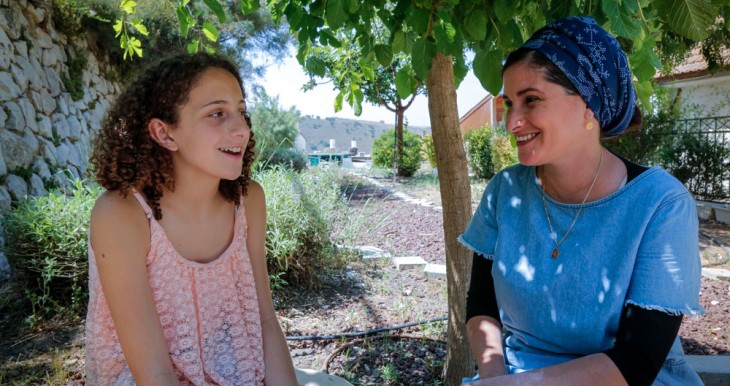Eden Adir’s mother, Zohar, acknowledges that she “can listen to Eden as a mother, but there are some things I can’t solve.” That’s where The Jewish Agency’s Youth Futures program has come in, playing a transformational role in 13-year-old Eden’s life for the past four years by providing her with much-needed mentorship outside of a home setting.
Eden, who originally joined the Youth Futures program at Yokneam-Megiddo as a 4th-grader, calls the program “a place where I can come to and talk about everything, where I can see the whole picture of all the elements of my life. It is also a place to breathe, to do something private.”
Established in 2006, Youth Futures helps children, young adults, families, and communities throughout Israel realize the vision of social change. The program is active in 36 locations and 200 schools, deploying 300 mentors who serve more than 12,000 students annually from elementary school through junior high school.
Youth Futures mentors are local young adults, professionally trained to guide 16 children in different circles of intervention: personal, familial, social, and educational, with an emphasis on full parental involvement and partnership in a long-term process spanning three to five years. Each participating community also has a family and community coordinator who works to help families access the social services to which they are entitled, teaches parenting skills, helps parents manage their budgets, and harnesses the resources of the community to build a positive educational environment for all children.
Eden recalls that she joined Youth Futures because her school counselor “suggested I should have a fixed framework, and have someone with whom I wouldn’t have to do lots of things in order to set up a meeting and talk to them.”
Youth Futures trustee (mentor) Ravit Grossman has helped Eden cope with various life events, including difficulties at home.
“We did creative things,” says Eden. “We made a portrait that describes growth in general, and mine in particular. It was an artistic work which we not only did for art’s sake, and which emphasized emotions.”
“Being [with Youth Futures] means enjoying a sense of quiet,” she adds. “I could also come to talk to Ravit outside of the regular hours. I have a sense of calm and confidence when talking to her.”
Zohar describes how Youth Futures has eased her daughter’s transitions, including from 6th to 7th grade (the start of junior high school).
“It helped Eden a lot that Ravit, the trustee, was with her throughout 6th grade and helped her get ready for 7th grade. The fact that Ravit is there gives Eden a sense of security, and alleviates the problems of acclimatization,” Zohar says.
Ravit says Eden “can talk for 45 minutes, nonstop, about things which are pure emotions. She brings everything to the room, and with the help of our conversations I start processes—comprehensive treatment with the grade teacher, counselor, and parents—and I devise an individual program which empowers her.”
“I am certain that Eden will succeed in anything she chooses,” Ravit declares. “When something is important for her she is very focused on the goal, and she goes all the way with it.”
Youth Futures has been operating at Yokneam-Megiddo for 11 years, and currently supports 112 children and families through a team of seven trustees, a community and family coordinator, and program director Yaniv Turgeman.
“Each child meets with the trustee, individually, once a week,” says Yaniv. “Group activity takes place once a week. There is also, naturally, system-based work with professionals in education, welfare, the psychological services, and formal education.”
Youth Futures is a particularly crucial resource in Yokneam, whose population includes a significant number of immigrant families from Ethiopia and the former Soviet Union, single-parent families, and families “in which the parents are busy with making a living and not with parenting,” according to Yaniv.
“The idea is to empower the children, to enable them to boost their self-confidence and strengths, through the personal relationship—through this the children share their personal challenges, whether they are in the home or with other children,” Yaniv explains. “This is a challenge that sometimes reveals complexities, but also gives the child a safe place to talk about their inner feelings and then to go out with their head held high. That enables the child to tend to their studies and make friends.”
Eden says that without Youth Futures, “I wouldn’t have had the confidence I have today. I would have missed the conversations outside the home, the listening….I know I am in safe hands.”
Learn more about Youth Futures >
This story was reported by Nathan Roi for The Jewish Agency for Israel



 0
0


